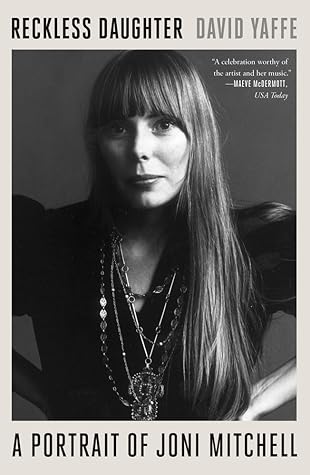More on this book
Community
Kindle Notes & Highlights
by
David Yaffe
Read between
August 1 - August 3, 2019
“Hiroshima cannot be pardoned! Don’t have kids when you get grown.”
“The loneliness that many polio patients experienced … was made worse by the very restrictive visiting policies of most rehabilitation hospitals in the 1940s and 1950s,” writes Daniel J. Wilson, the author of Polio. “The Shrine hospital in San Francisco, for example, permitted the parents of patients to visit only on Sundays for a half an hour, and parents were not allowed to come together.
As Nietzsche, Joni’s favorite philosopher, wrote, “I should only believe in a god who knew how to dance.”
“I sing my sorrow and paint my joy.”
The parting gift was a drawing of a pregnant woman and a line by the Japanese Buddhist priest Ryokan: “The thief left it behind—the moon at the window.”
Who knows what the good people at the label thought they were doing, but Joni needed to meet these attitudes with seriousness, what she felt she needed in order to be respected by a group of powerful men taking advantage of the sexual revolution without noticing the revolution part.
Joni recorded Blue in Studio C. The Carpenters were recording in Studio A. Carole King was recording Tapestry in Studio B.
When I wasn’t working on my own album I drove to Sunset Sound to play as a sideman and sing background on James [Taylor’s] songs
Sometimes it seemed as if James and I were recording one massive album in two different studios.”
I always think poetry is kind of like cracking sunflowers with your nails to get the meat out. It’s a lot of work for very little reward, in most cases.
in 1972, wrote an unconventional string quartet (two violas and two cellos) as a setting for “The Clown,” by the great New York School poet Frank O’Hara.
It reminded her of a quotation from Nietzsche she enjoyed repeating: “Poets muddy the water to make it seem deep.”
Joni took on his voice, his rage against the dying of the light. In his final summer, Mingus would be invited to a jazz performance at the Carter White House—the one where Dizzy and the onetime peanut farmer president shared a mic on “Salt Peanuts”—and, when everyone stood up for him, this guy who slapped the bass with as much force as anyone, and who could no longer play, was reduced to a quivering mess of tears.
Look, here’s the problem. You’re gonna single me out as pretentious in a country where ninety-nine percent of all singers, no matter where they’re from, sing with a fake black southern accent? The problem is probably that I’m the least pretentious and that’s what’s most pretentious about me.”
Mingus and Young watched a Cadillac they knew was owned by Stan Getz, a man Young might have called, in one of his coinages, half a motherfucker. “There’s a guy who’s driving a Cadillac on money from the way I play,” said Young.
Mingus’s elegy is for Young’s sound, ripped off, exploited, and misunderstood; what sounded cool was really Young’s lyricism, his mellow tone (to use an Ellingtonism), and his impeccable command of space.
Mingus died on January 5, 1979 (along with, according to the album’s liner notes, fifty-six beached whales). The album was released in June.
[my] illusions more than anything.” Black cool can be a posture of strength against a mainstream society that refuses to allow you to live within the full range of your humanity.
Her original plan was to use Weather Report as an opening act and backing band, just as she had done with the L.A. Express. The explanation for why this didn’t happen came from Weather Report’s keyboardist and co-leader (with Wayne Shorter), Joe Zawinul: “We ain’t no fucking L.A. Express.”
inveighing against the ’80s while using its commercial sounds, the aural equivalent of fluorescent lighting.
Joni went on to say, “I’m really strong as far as child-bearing goes.
But it’s a difficult time to bring children in the world.”
her voice on the album is essentially the same as it was on Rolling Thunder, although that was on the cusp of changing. “How did you go bankrupt?” wrote Hemingway. “Two ways: gradually and then suddenly.”
she smoked about four packs of cigarettes a day.
She had the negative capability to inhabit this man’s life, feel his longing, and belt out a melody that did not sound easy to sing.
He’d heat things up with sticks, cool them off with brushes, and rumble in the mysterium on mallets.


